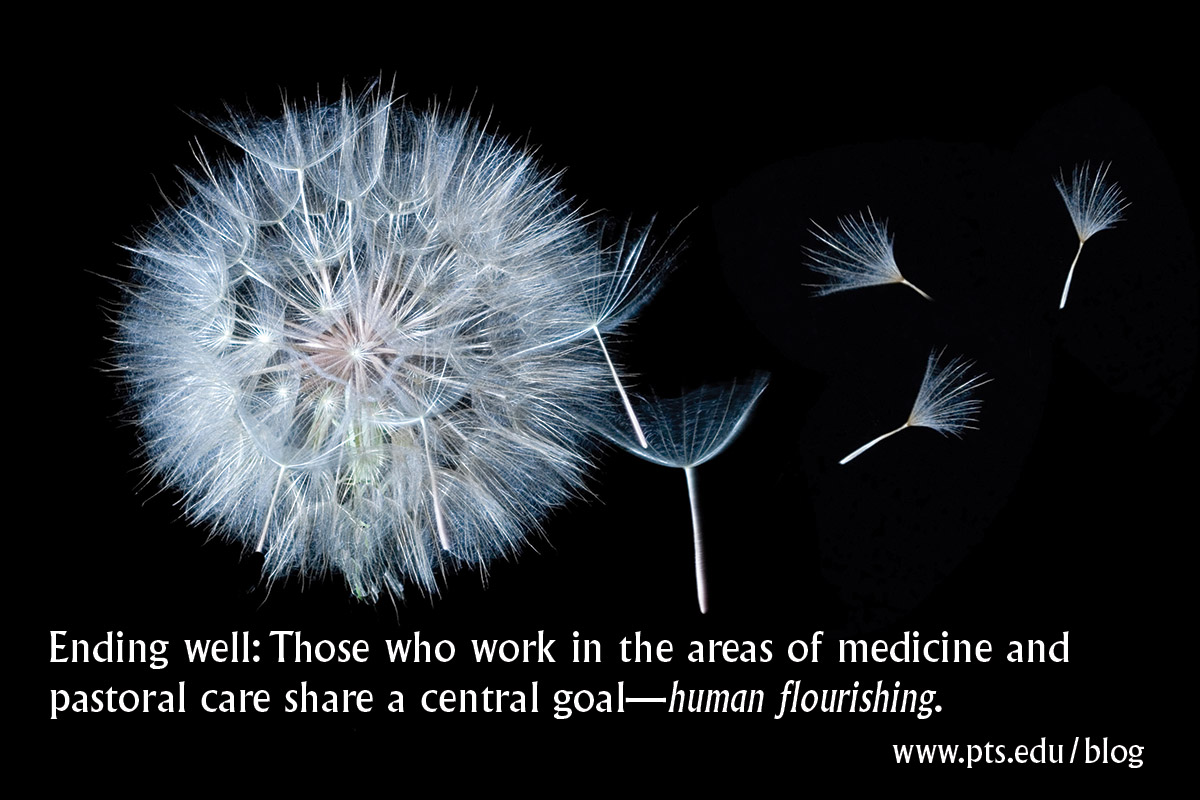Counseling and care for patients at end of life presents numerous and complex medical, emotional, and spiritual issues. These issues are often treated separately, yet they overlap and intermingle in the experience of the dying patient.
Some may argue that doctors and pastors should operate in our various spheres of influence and expertise and stay out of each other’s way. I suppose that’s one way of looking at it. But when it comes right down to it, I think those who work in the areas of medicine and pastoral care share a central goal—human flourishing, a broad understanding of the health and wholeness of individuals, families, and communities.
Medical professionals aren’t only concerned about eliminating disease from a person’s body and restoring that person to physical health; they are also concerned about the patient’s emotional, mental, and spiritual well-being. And, even when it’s clear that a person’s prognosis is very poor, medical caregivers continue to ask, “How can we make the time this person has left as comfortable and meaningful as possible?” At the same time, medical professionals also ask questions about the kinds of relational and communal support that patients have as they face serious illness and death, and they are concerned not only about individual patients but about the social structures that either contribute to or diminish the health of the wider public.
Likewise, pastoral care, at its best, takes a holistic view of human persons and communities. Most of us as pastoral caregivers and counselors do not operate within a framework where we are only concerned with the “state of a person’s soul,” and not with what happens to a person’s body or overall well-being. Instead, we try to overcome that dualistic split between spirit and body and see the whole person as the subject that we need to address. This is why pastoral counselors are so often called upon to participate in conversations about advance care planning or other end-of-life issues: because people recognize that facing death isn’t just about what happens to their physical bodies or deciding which treatments they will or won’t pursue. It’s also about coming to terms with all that death means emotionally and spiritually; it’s about engaging honestly with questions about meaning, suffering, and hope. These are questions which medical caregivers can also address with their patients, and this is why we need to work as a team.
I think it’s clear where the medical professionals’ expertise lies. Our expertise as pastoral caregivers involves helping to give theological or spiritual language to what is happening in a person’s life, in a way that is congruent with that person’s religious tradition. As part of pastoral counseling, we can also offer some other unique gifts to those we serve: for example, we can offer rituals and other religious practices as means through which people can cope with their suffering; we can offer the resources of the faith community to assist people in their time of need; and we can, from a very practical perspective, help people with planning for their funerals or other services that will commemorate and celebrate their lives. After a person dies, we can also offer continuing counseling and supportive care to grieving family members and friends in ways that are often not possible or appropriate for medical professionals.
German philosopher Martin Heidegger once wrote, “Care is the basic constitutive phenomenon of human existence.” In other words, care is what makes the human being human, and this is why we are called to practice it in our various institutions and in our communities. Without care, individuals and communities cannot flourish. If human flourishing is our aim, we must remember that care is at the heart of all we do, and we must be intentional about cooperating with others who share that vision, so that our care does not become too one-sided or isolated from other helpful perspectives.
The Rev. Dr. Leanna K. Fuller is assistant professor of pastoral care at Pittsburgh Theological Seminary and teaches in the MDiv Program. Her ministry experience includes serving as associate pastor of Oakland Christian Church in Suffolk, Va., where she coordinated youth ministry and Christian education programming. She writes regularly on pastoral care and counseling, pastoral theology, and congregational conflict.

